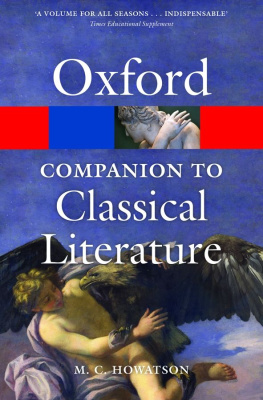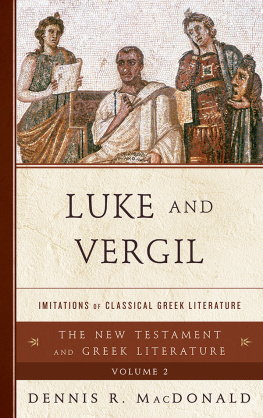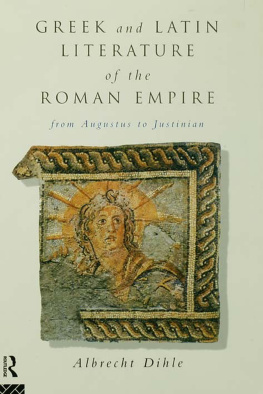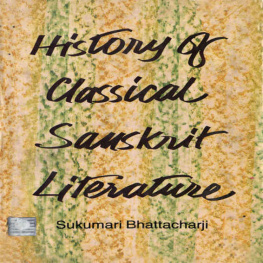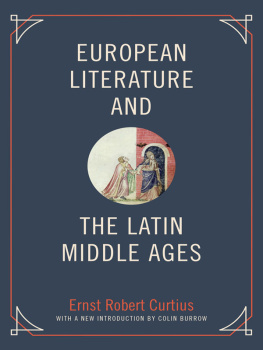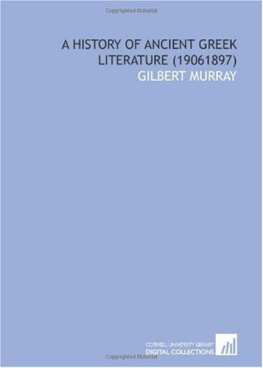THE
CLASSICAL
TRADITION
Helen, thy beauty is to me
Like those Nicean barks of yore,
That gently, oer a perfumed sea,
The weary, wayworn wanderer bore
To his own native shore.
On desperate seas long wont to roam,
Thy hyacinth hair, thy classic face,
Thy Naiad airs have brought me home
To the glory that was Greece
And the grandeur that was Rome.
THE
CLASSICAL
TRADITION
GREEK AND ROMAN INFLUENCES
ON WESTERN LITERATURE
BY
GILBERT HIGHET

Oxford University Press
Oxford New York Toronto
Delhi Bombay Calcutta Madras Karachi
Kuala Lumpur Singapore Hong Kong Tokyo
Nairobi Dar es Salaam Cape Town
Melbourne Auckland
and associated companies in
Beirut Berlin Ibadan Mexico City Nicosia
Copyright 1949 by Oxford University Press, Inc.; renewed 1976 by Gilbert Highet
First published in 1949 by the Clarendon Press, Oxford
First issued as an Oxford University Press paperback, 1957
Reissued in paperback, 1985, by Oxford University Press, Inc.,
198 Madison Avenue, New York, New York 100164314
Oxford is the registered trademark of Oxford University Press.
All rights reserved. No part of this publication may be reproduced,
stored in a retrieval system, or transmitted, in any form or by any means,
electronic, mechanical, photocopying, recording, or otherwise,
without the prior permission of Oxford University Press, Inc.
Library of Congress Cataloging-in-Publication Data
Highet, Gilbert, 19061978.
The classical tradition.
Bibliography: p.
Includes index.
1. Literature, ComparativeClassical and modern.
2. Literature, ComparativeModern and classical.
PN883. H5 1985 809 8515477
ISBN 019-500206-7 (pbk.)
Printing (last digit): 9 8 7 6
Printed in the United States of America
PREFACE
THIS book is an outline of the chief ways in which Greek and Latin influence has moulded the literatures of western Europe and America.
The Greeks invented nearly all the literary patterns which we use: tragedy and comedy, epic and romance, and many more. In the course of their two thousand years of writing they worked out innumerable themessome as light as Drink to me only with thine eyes, others as powerful as a brave mans journey through hell. These themes and patterns they passed on to the Romans, who developed them and added much of their own.
When the Roman empire fell civilization was nearly ruined. Literature and the arts became refugees, hiding in outlying areas or under the protection of the church. Few Europeans could read during the Dark Ages. Fewer still could write books. But those who could read and write did so with the help of the international Latin language, by blending Christian material with Greek and Roman thoughts.
New languages formed themselves, slowly, slowly. The first which has left a large and mature literature of its own is Anglo-Saxon, or Old English. After it came French; then Italian; and then the other European languages. When authors started to write in each of these new media, they told the stories and sang the songs which their own people knew. But they turned to Rome and Greece for guidance in strong or graceful expression, for interesting stories less well known, for trenchant ideas.
As these languages matured they constantly turned to the Greeks and Romans for further education and help. They enlarged their vocabulary by incorporating Greek and Roman words, as we are still doing: for instance, television. They copied and adapted the highly developed Greco-Roman devices of style. They learned famous stories, like the murder of Caesar or the doom of Oedipus. They found out the real powers of dramatic poetry, and realized what tragedy and comedy meant. Their authors modelled them-selves on Greek and Roman writers. Nations found inspiration for great political movements (such as the French Revolution) in Greece and Rome.
This process of education by imitating Greco-Roman literature, emulating its achievements, and adapting its themes and patterns, has been going on ever since our modern languages were formed. It has a continuous, though very chequered, history from about A.D. 700 to 1949. No single book could give a complete description of the process. As far as I know, there is not even an outline of it in existence. This work is an endeavour to provide such an outline.
There are a number of books which treat separate phases of this process. They discuss classical influence on the writers of one particular country, or in one particular period; or they describe the changing fortunes of one classical author in modern times, showing how the Middle Ages neglected him, how he was rediscovered in the Renaissance and much admired, how he fell out of favour in the seventeenth and eighteenth centuries, and how he re-emerged, to inspire a new group of authors, in the nineteenth and twentieth centuries. These works are extremely useful, and I am much indebted to their authors.
It would be an enormous, a Sisyphean, task to compile a bibliography of the whole subject. At least a volume as large as this would be needed. However, I have mentioned in the notes a considerable number of books which I have found useful; and I have added a short bibliography of the most recent general surveys of various sections of the subject. From these it should be easy to branch off and follow any particular channel which seems interesting. A great deal of the territory is still quite unexplored.
All book-titles and all quotations are given in English, unless some special reason intervenes. All translations (unless otherwise noted) are mine; the original text and the references will be found in the notes. In a book dealing with several different languages, I felt it might be distracting to have German phrases jostling French and Italian jostling Spanish.
Many of my friends and colleagues have been kind enough to read and criticize various sections of this book, and many others have drawn my attention to points which I had overlooked. I should like, in return for their salutary criticisms and constructive suggestions, to express my warm gratitude to the following: Cyril Bailey; Jean-Albert Bede; Margarete Bieber; Dino Bigongiari; Wilhelm Braun; Oscar Campbell; James Clifford; D. M. Davin; Elliot V. K. Dobbie; Charles Everett; Otis Fellows; Donald Frame; Horace Friess; W. M. Frohock; Moses Hadas; Alfred Harbage; Henry Hatfield; Werner Jaeger; Ernst Kapp; J. A. Krout; Roger Loomis; Arnaldo Momigliano; Frank Morley; Marjorie Hope Nicolson; Justin OBrien; Denys Page; R. H. Phelps; Austin Poole; Colin Roberts; Inez Scott Ryberg; Arthur Schiller; Kenneth Sisam; Herbert Smith; Norman Torrey; LaRue Van Hook; James Wardrop; T. J. Wertenbaker; and Ernest Hunter Wright.
I am also grateful to a number of my pupils who have been so good as to make suggestionsin particular Isabel Gaebelein and William Turner Levy. I have further to thank the members of the staff of Columbia University Library, especially the following, whose expert bibliographical knowledge has saved me many hours of searching: Constance Winchell, Jean Macalister, Charles Claar, Jane Davies, Alice Day, Karl Easton, Olive Johnson, Carl Reed, Lucy Reynolds, and Margaret Webb. And I must express my thanks to the Librarian and the staff of St. Andrews University Library, who gave me the traditional Scots hospitality.
One other debt, the greatest of all, is acknowledged in the dedication.
G. H.
COLUMBIA UNIVERSITY
NEW YORK
ACKNOWLEDGEMENTS
Next page

